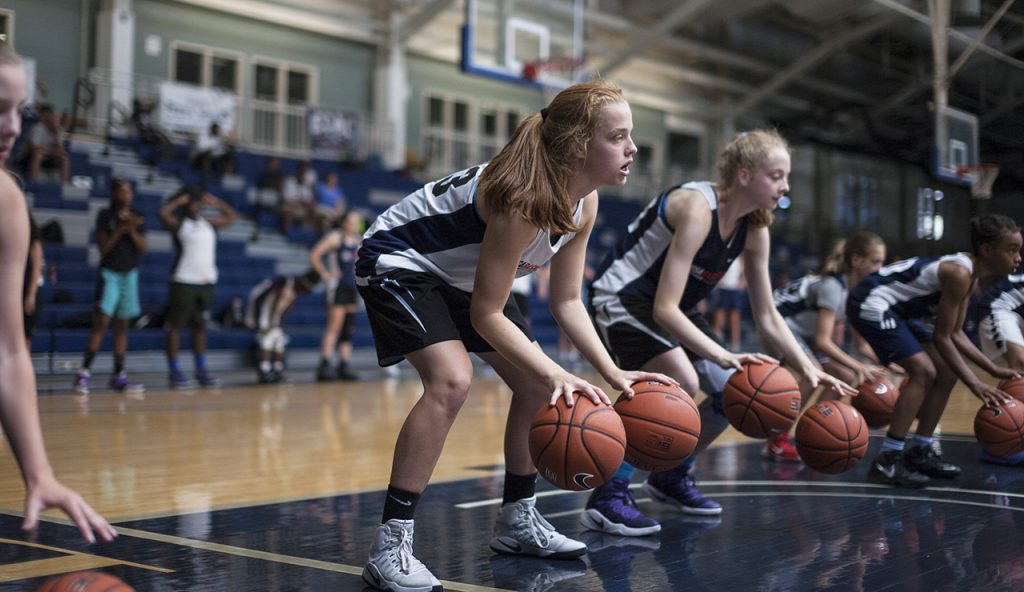Basketball practices are the lifeblood of a team’s development because they act as a furnace for honing strategies, forging skills, and fortifying team dynamics. In this extensive manual, we delve into the craft of designing captivating and productive basket ball practice plans that not only enthrall players but also foster their development both on and off the court.
Crafting a Roadmap for Success
Effective practice requires meticulous planning. Short, focused practice plans ensure that every minute on the court serves a purpose. A well-thought-out roadmap that includes skill drills, team strategies, and targeted segments for skill development, tactical training, and conditioning creates a balanced practice routine that maximizes player engagement and skill progression. Coaches must tailor plans to address the unique needs of the team.
Game Simulations
Short scrimmages and controlled game simulations provide a bridge between practice drills and actual gameplay. These sessions replicate the dynamics of real games, allowing players to apply learned skills in a more immersive setting.
Game simulations foster decision-making, teamwork, and adaptability. They create a competitive environment that heightens engagement and prepares players for the unpredictable nature of actual matches.
Purposeful Feedback
Feedback is a cornerstone of effective practice sessions. Short, specific feedback on individual and team performance fosters a culture of continuous improvement. Coaches must balance constructive criticism with positive reinforcement, creating an environment where players feel supported in their development.
Purposeful feedback goes beyond pointing out errors; it provides actionable insights for improvement. This approach ensures that players not only understand what needs correction but also how to implement changes effectively.
Precision in Repetition
Break down complex skills into short, focused stations. Precision in repetition is key to skill mastery. Short, targeted drills allow players to refine techniques, build muscle memory, and gain confidence in specific aspects of their game.
Skill stations cater to individual needs. Whether focusing on shooting, ball handling, or defensive maneuvers, these stations ensure players receive tailored attention to elevate their overall skill set.
Competitive Challenges
Incorporate short, competitive challenges into practice sessions. Whether it’s a shooting contest or a fast-break drill, challenges create a winning spirit and foster healthy competition among players. This approach not only boosts engagement but also cultivates a sense of camaraderie.
Competitive challenges can be interspersed throughout the practice plan, providing breaks from routine drills and injecting an element of fun into the session. This approach helps maintain high energy levels and keeps players mentally sharp.
Position-specific Training
Acknowledge the unique demands of each position. Short, position-specific training drills allow players to focus on the skills essential to their roles. This targeted approach contributes to a well-rounded team with players excelling in their designated positions.
Position-specific training ensures that players understand the nuances of their roles on the court. It allows for a deeper understanding of responsibilities and enhances overall team performance.
Tactical Discussions
Basketball is a thinking game as much as a physical one. Short tactical discussions, both during and after practice, engage players’ minds. Discussing offensive and defensive strategies fosters a deeper understanding of the game.
Players who grasp the strategic elements of basketball are more adaptable on the court. Tactical discussions contribute to a team’s basketball IQ, ensuring that players make informed decisions during live gameplay.
High-energy Warm-ups
Start practice with short, high-energy warm-ups that combine dynamic movements, stretching, and team-building activities to prepare players physically and mentally, set the tone for a focused session, and ignite enthusiasm. These concise warm-ups serve as a transition to the basketball mindset, signaling the start of an effective practice.
Time Management
Structure practice sessions with short, focused segments. Efficient time management ensures that players stay engaged and that every aspect of the game receives attention. Prioritize quality over quantity in drills and exercises.
Effective time management allows sessions to become more varied. Short, intense segments keep players on their toes, maximizing their attention and ensuring that each practice session is a valuable investment in their development.
Conditioning Drills
Basketball is a physically demanding sport. Integrate short, intense conditioning drills to build endurance. This not only improves overall fitness but also ensures that players remain sharp and focused throughout the entirety of a game.
Conditioning drills should be challenging yet manageable. Short bursts of intense activity mimic the stop-and-start nature of basketball, preparing players for the physical demands of actual gameplay.
Rest and Recovery
While intensity is crucial, balance it with short breaks. Adequate rest prevents burnout, allowing players to maintain peak performance throughout the season. Incorporate brief recovery periods to optimize overall physical and mental well-being.
Rest and recovery are integral components of effective practice sessions. Short breaks ensure that players remain fresh and alert, enhancing their ability to absorb coaching instructions and execute drills effectively.
Visit Here to Related Post to discover a treasure trove of drill ideas!
Conclusion
Creating engaging and effective basketball practice sessions is an art that involves a strategic blend of varied drills, competitive challenges, and tactical discussions. Coaches serve as architects, shaping skilled players and fostering a culture of discipline, camaraderie, and continuous improvement. By adhering to these insights, coaches can ensure that every practice session contributes to the holistic development of players both on and off the court.
You may also like
-
From Prodigy to Leader: Can Shubman Gill Shape the Future of Indian Test Cricket?
-
Sports Picks from AI: Enhancing Athletic Analysis and Predictions
-
Unveiling the Triple Treat Mazaplay, T20Exchange, and Betbook247 – A Symphony of Online Entertainmen
-
A Comprehensive Guide to Finding the Best Paddleboards for Your Adventure
-
Best sportswear manufacturer in Pakistan

